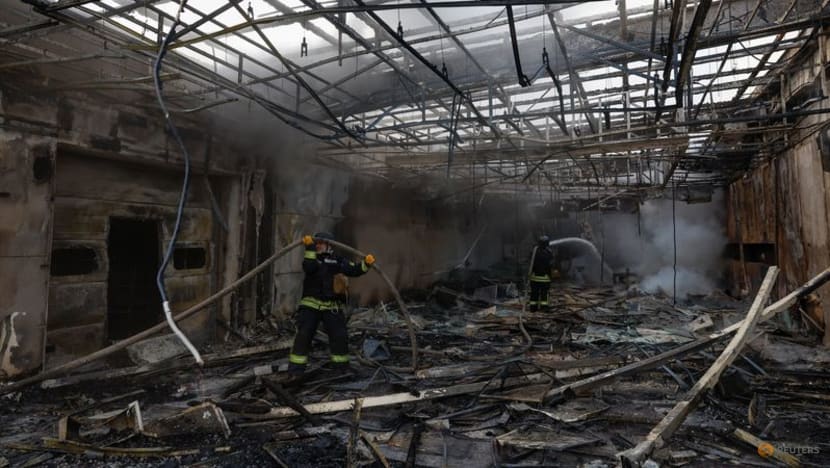Russia launches war's largest drone attack ahead of Putin-Trump call

Firefighters work at the site of a private enterprise hit by a Russian drone strike, amid Russia's attack on Ukraine, outside of Kyiv, Ukraine on May 18, 2025. (Photo: REUTERS/Valentyn Ogirenko)
KYIV: Russia launched on Sunday (May 18) its largest drone attack on Ukraine since the start of the war, destroying homes and killing at least one woman a day before US President Donald Trump is due to discuss a proposed ceasefire with Russia's Vladimir Putin.
Ukraine's intelligence service said it also believed Moscow intended to fire an intercontinental ballistic missile later on Sunday as an attempt to intimidate the West. There was no immediate response from Moscow to the accusation.
President Volodymyr Zelenskyy, straining to restore ties with Washington after a disastrous February White House visit, met Vice President JD Vance and Secretary of State Marco Rubio in Rome on Sunday on the sidelines of Pope Leo's inauguration.
Zelenskyy said the meeting was "good" and released pictures of Ukrainian and US officials sitting outside at a round table and smiling. Ukrainian media said the meeting lasted 40 minutes.
"I reaffirmed that Ukraine is ready to be engaged in real diplomacy and underscored the importance of a full and unconditional ceasefire as soon as possible," said Zelenskyy, who also met the new pope.
Ukraine and Russia held their first face-to-face talks in more than three years on Friday, under pressure from Trump to agree to a ceasefire in a war he has pledged to bring to a quick end. The foes agreed to swap 1,000 prisoners each but failed to agree a truce, after Moscow presented conditions that a member of Ukraine's delegation called "non-starters".
The leaders of Britain, France, Germany and Poland planned to speak to Trump before the US and Russian presidents speak on Monday, German Chancellor Friedrich Merz said. The four European leaders jointly visited Kyiv last week and have been calling for Trump to back new sanctions on Russia.
Asked if it was time to impose tougher sanctions on Russia, US Treasury Secretary Scott Bessent said that was up to Trump.
"I think we will see what happens when both sides get to the table," he told NBC News' Meet the Press programme.
"President Trump has made it very clear, that if President Putin does not negotiate in good faith, that the United States will not hesitate to up the Russia sanctions along with our European partners."
After a night of air alerts, Ukraine's air force said that as of 8am on Sunday, Russia had launched 273 drones at Ukrainian cities, more than the previous record Moscow had set in February on the war's third anniversary.
"I COULD HEAR THE DRONE"
In the ruins of her family home in the Obukhiv region west of Kyiv, Natalia Piven, 44, recounted how she squeezed into a cellar with her son after an air raid warning, just in time to survive a first wave of drones.
They then ran out to a bomb shelter at a kindergarten, before another wave of drones bore down on the village. Their house was completely destroyed. A 28-year-old woman who lived next door was killed. Ukrainian authorities said three other people were injured, including a four-year-old child.
"I cannot get over it. I simply cannot. I could clearly hear the drone flying right towards my house," Piven told Reuters.
Trump has shifted US rhetoric from supporting Ukraine towards accepting some of Moscow's narrative about the war that Putin launched in 2022. But Kyiv and its European allies are working hard to persuade Trump that it is Moscow that is holding up a truce now.
Zelenskyy has said he would accept Trump's proposal for an immediate ceasefire of at least 30 days with no conditions. Moscow says it would consider a ceasefire but only if conditions are met, including a halt in arms supplies to Kyiv.
It also says any peace talks must address the "root causes" of the conflict, including its demands that Ukraine cede territory, be disarmed and accept neutral status. Kyiv says that would amount to capitulation and leave it defenceless.
TRUMP HARDENS STANCE
Observers said they are not hopeful the much-anticipated Trump-Putin phone call will lead to a breakthrough in peace negotiations.
Melinda Haring, senior fellow at international affairs think tank Atlantic Council's Eurasia Center, said Putin's no-show at Friday's peace talks and Russia's latest drone attack shows that Moscow does not want a ceasefire.
"Back on Friday, Putin refused to come. If Putin's not there, it's not a real negotiation. They sent low-level negotiators," she told CNA's Asia First.
"If Russia continues to over try to overwhelm Ukraine's air defences and it doesn't stop hitting civilians, that's another clue that they're not serious."
On the options that Trump could take to pressure Putin into a peace deal, Haring said the US president "could definitely tighten sanctions".
"But Donald Trump could also decide to arm Ukraine to the teeth. That's always an option, and that's one that he hasn't pursued so far," she added.
"We know that Donald Trump has a soft spot for Vladimir Putin, but he is starting to harden. He's getting annoyed that Putin won't engage with a real ceasefire.
"I expect him to be much more forceful in that phone call with the Russian president."















